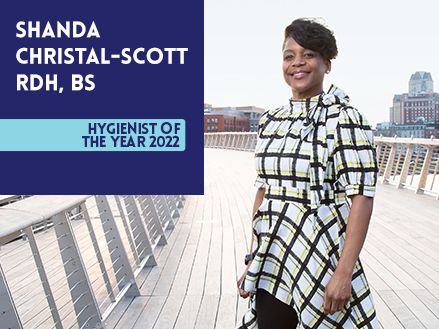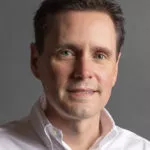
Our new Hygienist of the Year honor celebrates the distinguished legacy and indispensable contributions of dental hygienists worldwide. Beginning with this issue, we’ll annually shine a spotlight on the inspirational and influential power of hygienists who are changing dentistry for the better and making a positive impact on their communities in unique, noteworthy ways.

SOMETIMES THE hardest things in life can ultimately be the most rewarding. While dental professionals are widely known for giving back, it takes a special individual to devote 100 percent of her career to serving the most challenging patient populations with caring, passion and empathy. Yet that’s exactly what our inaugural Hygienist of the Year has done—and she wouldn’t have it any other way.
It took years of work and determination for Shanda Christal-Scott to achieve her career goals. That same spirit drives her every day as she treats the underserved, those with special needs and the incarcerated. (She’s quick to correct us on one point, however: She doesn’t work every day. “I try to take off at least one day a week, usually Sundays,” she says without a trace of irony.)
Home base is the Samuels Sinclair Dental Center in Providence, part of Rhode Island Hospital—a facility dedicated to providing care for children as well as medically complex, intellectually or developmentally disabled patients of all ages. Her work also regularly takes her about nine miles down Interstate 95 to the nearby Donald W. Wyatt Detention Facility, whose population includes ICE detainees.
“If you truly want to help the underserved, you have to rid yourself of bias, never judge, be patient and really get to know people.”
She somehow finds time to mentor and teach students as well, placing special emphasis on cultivating empathy. “It’s about helping them overcome their fear of the unknown and showing them there’s nothing to be afraid of,” she says. “All our patients are human beings. If you truly want to help the underserved, you have to rid yourself of bias, never judge, be patient and really get to know people.”
Even the Covid-19 shutdowns didn’t sideline her. She and her colleagues deployed from the dental clinic to the main hospital, where they tested more than 250 patients daily. She admits the pandemic’s early days were uncertain times. “I’m my family’s sole source of income, so I need to stay healthy to keep us financially afloat.” (She’s mother to two daughters, Asalee and Aaralyn, grandmother to Kyle and dog mom to Pluto.)
She emphasizes that she was “a little nervous, but not scared” over the virus itself, owing to dentistry’s rigorous attention to infection control. Unsurprisingly, after the clinic reopened full-time, Christal-Scott continued her Covid testing work at the hospital. “Watching the shortages and understaffing was heartbreaking. I was needed, so I went.”
She originally planned to be a nurse, starting her career in 1992 as a nursing home CNA. After four years, a friend told her about a group home where she ended up working for eight years, attending nursing classes the whole time. “I had a strong desire to become an advocate for special-needs patients as my rapport with them developed.”
While ferrying residents to their dental appointments, she connected with a hygienist named Helen Brennan, whose focus is special-needs patients. “Watching her really inspired me, especially the way she put patients at ease.” Those experiences helped cement her decision to switch from nursing to hygiene.
With a waiting list standing between her and her hygiene program of choice, she became a dental assistant to help speed her acceptance. She was assigned to the Sinclair Dental Center, but it would take several years and a few detours before she found her way back there as a hygienist, first on a per diem basis and finally full-time.
“Watching the Covid shortages and understaffing was heartbreaking. I was needed, so I went.”
The work takes a physical toll, an overlooked aspect of treating special-needs patients. “You have to move where patients move,” Christal-Scott says, “even with two or three assistants working to stabilize them.” Regular workouts are an essential part of her routine to stay strong and flexible, along with massages to soothe tired muscles.
Today, she applies her passion for education to giving lectures and workshops, in addition to instilling health lessons in patients at the Wyatt Detention Center. “I want to see them succeed,” she says. “Dispelling myths and misinformation is important so they’ll not only become healthier themselves, but also pass what they learn along to their own families.” But her greatest reward still comes from treating patients whom others write off as untreatable. Her success is evidenced by the sizable base of loyal patients who refuse to be seen by anyone else.
At just 47, Shanda Christal-Scott has accomplished a great deal. Does she ever think about settling into a less physically and emotionally taxing position, perhaps as an administrator? Her answer is a firm no. “I have to see patients. Sitting behind a desk is not me.” That should come as great relief to the many patients and coworkers who count on her. As her dentist colleague Dr. Sara DiNardo tells us, “I am honored to work beside her every day. She is someone who will forever be learning.”




